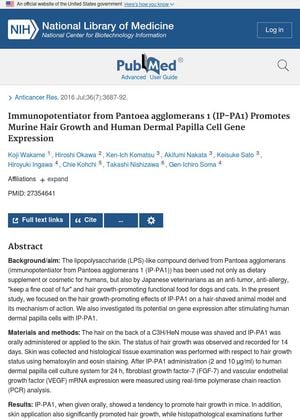Immunopotentiator from Pantoea Agglomerans 1 (IP-PA1) Promotes Murine Hair Growth and Human Dermal Papilla Cell Gene Expression
July 2016
in “
PubMed
”

TLDR IP-PA1 helps grow hair in mice and affects human cell growth-related genes differently than traditional hair growth treatments.
In 2016, a study was conducted to investigate the hair growth-promoting effects of Immunopotentiator from Pantoea agglomerans 1 (IP-PA1). The compound was administered orally or applied to the skin of a C3H/HeN mouse, and hair growth was observed for 14 days. The results showed that IP-PA1 promoted hair growth in mice when given orally and significantly promoted hair growth when applied to the skin. Histopathological examinations further demonstrated hair elongation from dermal papilla cells. In a human dermal papilla cell culture system, significant fibroblast growth factor-7 (FGF-7) and vascular endothelial growth factor (VEGF) mRNA expressions were observed after IP-PA1 administration. The study concluded that the mechanism of gene expression by which IP-PA1 promotes hair growth is different from that of medicine and traditional hair tonics, such as minoxidil and adenosine.





